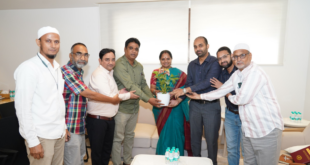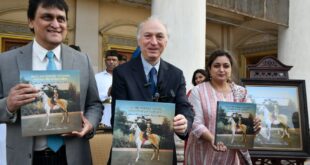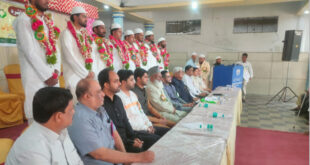A 13-year long stint as the official spokesperson of the Central Bureau of Intelligence. Press Secretary for former President of India Dr. A.P.J.Abdul Kalam until his demise on July 27 last year. Director General of News at Doordarshan. That’s a short bio of Mr. S.M. Khan, a 1982 batch IIS officer. In an exclusive interview in his current capacity as the Director General – Registrar of Newspapers of India, he shares with us the good, the bad and future of RNI. Here are the excerpts from the interview:
The rising prominence and prevalence of new media platforms, social media in particular, has significantly impacted the print media industry. How do you look at it?
The print media in India, newspapers in particular, will continue to thrive for the next 10-15 years. We have recorded a 5.8% growth in registrations over last year. I think that indicates that the print is unshaken by the developments in social (or new) media.
What’s holding it together?
People are still interested in print media and they want to see the news in print. India has a future for print (industry). There are over 1 lakh registered newspapers and it (the number) is growing every day. We are receiving nearly 100 new applications every day.
How is the growth for Urdu newspapers in general?
The growth in vernacular newspapers is tremendous. There are no separate sections. It is English and other languages and Urdu along with Assamese, Telugu, Hindi, Marathi, etc is classified under ‘other languages’. The growth of vernacular newspapers is tremendous.
Of the 100 applications you receive, how many are actually approved?
There is formidable enthusiasm among Indians in registering a publication. The RNI is issuing approximately 300-350 certificates of registrations every month.
Does that imply that only 10% of all applications received are approved and granted titles?
No, that’s not so. The registration process takes at least 3-4 months to complete. The number of registrations cannot be directly correlated with the number of applications received, nor does it signify the ratio of those rejected or deferred due to incomplete. Sometimes, parts of the application are incomplete, and it may take longer than expected for such registrations.
The RNI has completed 60 years on 1st of July. What are the changes in store? Are they plans for an overhaul?
We are planning to make all services online.” Currently, the RNI has made Title applications and Annual Statements online. The next step is to make more services online.
There were reports earlier that the RNI is running out of titles? What is the situation now?
Yes, that’s correct. We have over a lakh registered publications and new titles are added regularly. So, certainly there’s a shortage of titles. But not all the registered publications are active. We receive annual statements of only about 25000 publications from the total 1 lakh titles or so. There are many dormant titles. We are planning to de-register them, but that requires an amendment in the act of Parliament, and we are working on that.
The act should be approved by the Parliament of India shortly. With this, a large number of not functional papers will be de-registered if the publication fails to submit the annual statement for three consecutive years. The same title will be gradually made available to a potential applicant.
Thank you, Mr. Khan.
Thank you.
Mr. Khan was speaking exclusively to this journalist after the dinner organized by Mr. Syed Vicaruddin, Chief Editor of nonagenarian Urdu daily Rahnuma-e-Deccan at the latter’s residence. Mr. Naveen Mittal, Commissioner of Information and Public Relations, Government of Telangana, Mr. Zahed Ali Khan, Chief Editor – Siasat Urdu Daily, Dr. Syed Fazil Hussain Parvez, Chief Editor – Gawah Urdu Weekly, Mr. Zaheeruddin Ali Khan, Managing Editor – Siasat and retired Justice Mr. E. Ismail were among the guests.
RNI is the central organization that issues titles and registrations for newspapers in India.
 Gawah (The Witness) – Hyderabad India Fearless By Birth, Pristine by Choice – First National Urdu Weekly From South India – Latest News, Breaking News, Special Stories, Interviews, Islamic, World, India, National News
Gawah (The Witness) – Hyderabad India Fearless By Birth, Pristine by Choice – First National Urdu Weekly From South India – Latest News, Breaking News, Special Stories, Interviews, Islamic, World, India, National News




